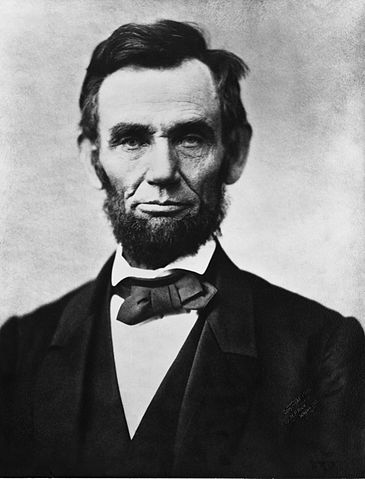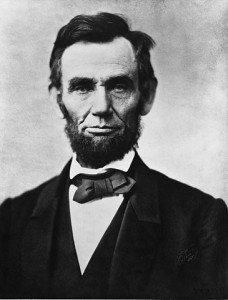
February 12 used to be celebrated as a federal and state holiday called Lincoln’s Birthday. However when it was decided in the 1990’s to consolidate all presidential birthday holidays (there were only two celebrated as a federal holiday-George Washington and Abraham Lincoln), the individual holidays were eliminated. So today we celebrate the traditional day that celebrates the life of Abraham Lincoln, who led this country through one of its most painful times-the War between the States or also called the American Civil War.
=
On 12 February 1809, future president Abraham Lincoln was born in Hodgenville, Kentucky. Growing up in a poor family in Kentucky and Indiana, he only attended school for one year. However, he was determined to improve his mind and read books to increase his knowledge. As an adult in Illinois, he held a number of jobs from postmaster to shopkeeper before entering politics by serving in the Illinois legislature from 1834-1842. He then served in Congress from 1847-1849. He married Mary Todd in 1842 and had four sons by him.
During the 1850’s he returned to politics and was an important leader in the new Republican Party. Slavery had been a major issue especially when new states or territories were being added. Though not an advocate for slavery, he sought to avoid conflict by limiting the expansion of slavery into new states but allowing it to remain where it was already practiced. The secessionist movement though was rising, and he argued that such a division would divide them and destroy the union created in the formation of the United States.
His oratory won him praises and recognition of his status as a leader. And it helped to cool the secessionists for a time. Though he did not seek the abolition of slavery in the South, when he was elected president in 1860 many states began seceding and war would soon commence between the United States and the Confederate States of America. Lincoln became fully committed as a result to the abolition of slavery. He would sign the Emancipation Proclamation of 1863 that freed slaves in the Confederate States. It did not apply right away to the entire nation (which was resolved by the 13th Amendment that outlawed for the entire nation).
Lincoln was known for his dry wit, his impressive stature at 6′ 4, and he also loved animals as well. During his time in the White House there were a variety of pets that included a pet turkey and a goat. His humor hid from people his depression at times as to what was going on with the war. He was plagued early on with military defeats and some generals who were more used to parade grounds than actually conducting military operations. Pro-Confederacy newspapers mocked him mercilessly. And Confederate sympathizers called him a despot for signing the Emancipation Proclamation. He was killed after the wars end by John Wilkes Booth on 14 April 1865. His favorite horse, Old Bob, was part of the funeral procession.
He is remembered as the Great Emancipator for under his presidency the United States fought to abolish slavery. While many criticize him for his moderate views in his early years, he became totally committed to its abolition during the war. While the 13th Amendment was passed by Congress before his assassination, it was not formally ratified by the states until December 1865.
Sources
“Abraham Lincoln | Biography, Childhood, Quotes, Death, and Facts.” Encyclopedia Britannica, 12 Feb. 2024, www.britannica.com/biography/Abraham-Lincoln.
“Abraham Lincoln: Facts, Birthday and Assassination | HISTORY.” HISTORY, 29 Oct. 2009, www.history.com/topics/us-presidents/abraham-lincoln.
Piccotti, Tyler. “Abraham Lincoln.” Biography, 28 Dec. 2023, www.biography.com/political-figures/abraham-lincoln.
“Abraham Lincoln’s Presidency | Civil War and Reconstruction, 1861-1877 | U.S. History Primary Source Timeline | Classroom Materials at the Library of Congress | Library of Congress.” The Library of Congress, www.loc.gov/classroom-materials/united-states-history-primary-source-timeline/civil-war-and-reconstruction-1861-1877/lincoln.
Check out our Amazon store for books on Abraham Lincoln.
Purchase or view the movie Glory at Amazon.







